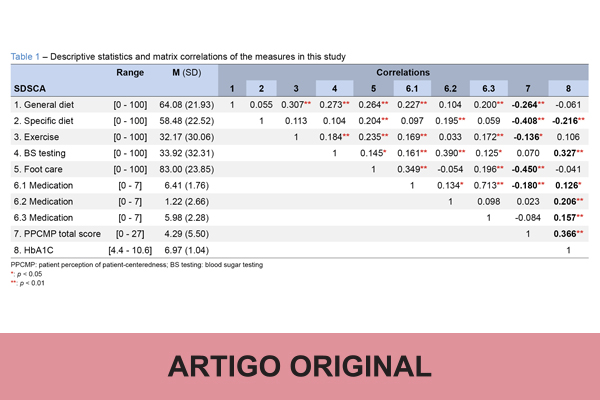SOCIAL MEDIA
Portuguese Medical Association's Scientific Journal

Introduction: Even though the prevalence rate of diabetes in Portugal is one of the highest in Europe, no studies on the association between patient centered medicine, diabetes self-care, and glycemic control have been published. Assuming that patient centered medicine increases adherence to treatment through the improvement of the doctor-patient relationship, the aim of this study was to assess the influence of patient-centered medicine on the self-care of patients with type 2 diabetes patients’ (T2DM) in two Family Health Units in Central Portugal, according to gender and age.
Material and Methods: A cross-sectional study was conducted in two Family Health Units in Central Portugal between the 25th November 2021 and the 15th January 2022. Patients with type 2 diabetes were invited to fill in the Patient-Centered Medicine questionnaire, for patients (PCM-p) (where higher values represent worse results) and the Summary of Diabetes Self-Care Activities Measure (SDSCAM), (where higher values represent better results), while healthcare professionals filled in the epidemiologic variables on pre-defined days.
Results: A sample of 298 patients with type 2 diabetes was studied. Linear regressions for the association between SDSCAM scale factors and PCM-p showed significant associations for general diet (β = -0.07, p < 0.001), specific diet (β = -0.10, p < 0.001), exercise (β = -0.03, p = 0.008), foot care (β = -0.11, p < 0.001) and medication adherence in general (β = -0.06, p = 0.001). Multiple linear regression including the association between glycated hemoglobin (HbA1c) and the SDSCAM scale dimensions showed that specific diet was associated with lower HbA1c levels (β = -0.01, p = 0.007) and blood sugar testing (β = 0.01, p < 0.001) and that a higher score in PCMp was associated with higher HbA1c levels (β = 0.06, p < 0.001). Male patients (β = -6.93, p = 0.007) and older patients (β = -0.42, p = 0.001) were associated with lower scores in the specific diet. The male gender was associated with higher scores in exercise (β = 7.62, p = 0.029), lower scores in foot care (β = -6.06, p = 0.029) and lower scores in medication adherence to injectable medicines/6.2 (β = -0.73, p = 0.018). Age was associated with a lower score in medication (β = -0.03, p = 0.045) and a higher PCMp total score (β = 0.07, p = 0.030).
Conclusion: Patient-centered medicine in type 2 diabetics is associated with better self-care behaviors in patients with type 2 diabetes. Gender and age differences were observed in self-care behaviors and age differences were observed in Patient Centered Medicine.